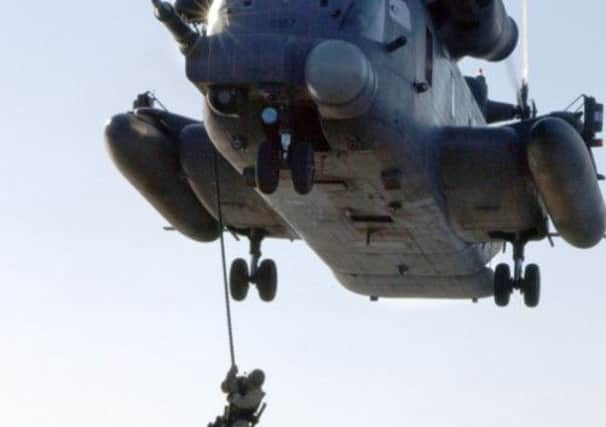US navy Seals snatch al-Qaeda suspect in Libya


Nazih Abdul-Hamed al-Ruqaii, known by the alias Anas al-Liby, was captured in a raid at his home in the Libyan capital, Tripoli, in the raid on Saturday.
Liby, believed to be a computer specialist for al-Qaeda, is on the FBI’s most-wanted list with a $5 million (£3.1m) bounty on his head. He was indicted by a federal court in New York for his alleged role in the bombings of US embassies in Dar es Salaam, Tanzania, and Nairobi, Kenya, on 7 August 1998.
Advertisement
Hide AdAdvertisement
Hide AdBut Libya said last night that it had asked the United States for “clarifications” regarding the raid, saying Libyan nationals should be tried in their own country.
In a statement, the government said it “contacted the American authorities and asked it to present clarifications” regarding the Liby abduction. It also said it hoped the incident would not impact its strategic relationship with the US.
Earlier, a US navy Seal team swam ashore near Baraawe, a town in southern Somalia, before militants of the al-Qaeda-linked terrorist group al-Shabaab had risen for dawn prayers, officials said.
The raid on a house in the town targeted an al-Qaeda suspect related to the mall attack, but was aborted after an intense battle with militants.
In Washington, Pentagon spokesman George Little confirmed the raid in Somalia, but did not provide details.
A Pentagon statement said Liby had been “lawfully detained under the law of war in a secure location outside of Libya”.
It said: “The successful capture operation was made possible by superb work and co-ordination across our national security agencies and the intelligence community, and was approved by President [Barack] Obama.”
US secretary of state John Kerry said the raids would send the message that terrorists “can run but they can’t hide”.
Advertisement
Hide AdAdvertisement
Hide Ad“We hope that this makes clear that the United States of America will never stop in the effort to hold those accountable who conduct acts of terror,” Mr Kerry said, from Bali, Indonesia, where he is attending an economic summit.
“Members of al-Qaeda and other terrorist organisations literally can run, but they can’t hide,” he added.
Mr Kerry vowed the US would “continue to try to bring people to justice in an appropriate way with hopes that ultimately these kinds of activities against everybody in the world will stop”.
The Somalia raid was carried out by members of Seal Team Six, the same unit that killed al-Qaeda leader Osama bin Laden in his Pakistan hideout in 2011, a senior US military source said.
But this time, Seal Team Six members encountered fiercer resistance than expected. After a 15-20 minute firefight, the unit leader decided to abort the mission and they swam away, the official said.
The leader of al-Shabaab, Mukhtar Abu Zubeyr, also known as Ahmed Godane, claimed responsibility for the attack on the Westgate mall in Nairobi, Kenya, a four-day terrorist siege that began on 21 September and killed at least 67 people. A Somali intelligence official said Zubeyr had been the target of the Baraawe raid.
Al-Shabaab and al-Qaeda have flourished in Somalia for years. Some of the plotters of the 1998 bombings of US embassies in Kenya and Tanzania hid out there.
Last night, Liby’s son, Abdullah al-Ragye, 19, said he had been told that men had pulled up in four cars, knocked his father out with some kind of drug, dragged him from his vehicle and driven off with him.
Advertisement
Hide AdAdvertisement
Hide Ad“They had a Libyan look and Libyan accents,” he said. It was not clear, however, whether the men were connected to the Libyan state, which may either have sought to keep its distance or been sidelined by Washington for fear of leaks.
Abdul Bassit Haroun, a former Islamist militia commander who works with the Libyan government on security, said the US raid would show Libya was no refuge for “international terrorists”. He added: “But it is also very bad that no state institutions had the slightest information about this process, nor do they have a force which was able to capture him.”
He warned that Islamist militants, like those blamed for the fatal attack on the US consulate in Benghazi a year ago, would hit back violently: “This won’t just pass,” Mr Haroun said. “There will be a strong reaction in order to take revenge.”
From Nigeria in the west, through Mali, Algeria and Libya to Somalia and Kenya in the east, Africa has seen major attacks on its own people and on western economic interests, including an Algerian desert gas plant in January and the Nairobi mall, as well as the killing of the US ambassador in Libya a year ago.
The trend reflects several factors, including western efforts to force al-Qaeda from its former base in Afghanistan, the overthrow of anti-Islamist authoritarian rulers in the Arab Spring of 2011 and resentment among Africa’s poor of governments they view as corrupt pawns of western powers.
Western intelligence experts say there is evidence of links among Islamist militants across northern Africa, who share al-Qaeda’s goal of a strict Islamic state.